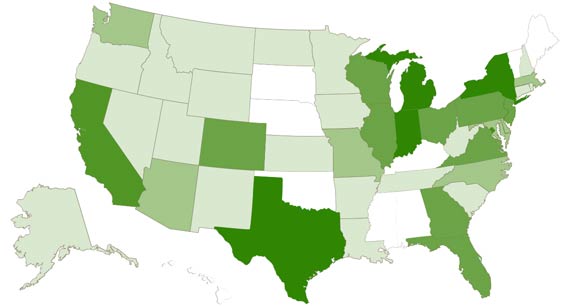
Resources:


Possible Careers:
• Special education teachers
• Elementary teachers
• Behavior analysts
• Resource room teachers
• Paraprofessionals
Estimated Starting Salary:
• $35,000 - $45,000
Source: Zippia.com
Source: Zippia.com
Undergraduate Degree - Special Education
Admission
To earn a Bachelor of Arts degree in special education, students must apply and be admitted to the Teacher Certification Program administered by the Department of Teacher Education in the College of Education. Refer to Admission to the Teacher Certification Program in the Department of Teacher Education section of this catalog. Information about admission requirements and the application process can be found at http://education.msu.edu/academics/undergraduate/apply-teacher-prep.asp.
In addition to general admission requirements, applicants applying for admission to the Teacher Certification Program with a major in special education must also complete one or two supervised pre-admission experiences totaling at least 42 hours in the area of learning disabilities. Prospective special education students are strongly encouraged to talk with special education faculty about the potential value of sites for securing the required experience. Applicants to the special education program must submit a form verifying completion of the experience with the completed application. Only students who have completed the required experience will be considered for admission.
Requirements for the Bachelor of Arts Degree in Special Education
- The University requirements for bachelor’s degrees as described in the Undergraduate Education section of this catalog; 120 credits, including general elective credits, are required for the Bachelor of Arts degree in Special Education.
The completion of Mathematics 201 referenced in item 2. b. (1) below may also satisfy the University mathematics requirement.
The University’s Tier II writing requirement for the Special Education major is met by completing Counseling, Educational Psychology and Special Education 301. That course is referenced in item 2. d. below. - The following requirements for the major:
a. Professional Education Courses (19 credits): (1) All of the following courses (19 credits): CEP 240 Diverse Learners in Multicultural Perspectives 3 TE 101 Social Foundations of Justice and Equity in Education 3 TE 102 Pedagogy and Politics of Justice and Equity in Education 3 TE 150 Reflections on Learning 3 TE 341 Teaching and Learning of (Bi) Multilingual Learners 3 TE 371 Justice and Equity Seminar I 1 TE 372 Justice and Equity Seminar II 1 TE 471 Justice and Equity Seminar III 1 TE 472 Justice and Equity Seminar IV 1 b. Elementary Education Courses (25 or 26 credits): (1) All of the following courses (10 credits): TE 100 Introduction to Early Childhood and Elementary Education 1 TE 333 Social Studies for Young Learners (PK-6) 3 TE 403 Teaching of Science to Diverse Learners - Elementary 3 TE 404 Teaching of Social Studies to Diverse Learners – Elementary 3 (2) One of the following language acquisition and development courses (3 or 4 credits): LIN 200 Introduction to Language 3 LIN 401 Introduction to Linguistics 4 (3) Both of the following literacy courses (6 credits): TE 301 Children’s Literacy Development (W) 3 TE 348 Reading and Responding to Children’s Literature 3 (4) Both of the following mathematics courses (6 credits): MTH 201 Elementary Mathematics for Teachers I 3 MTH 202 Elementary Mathematics for Teachers II 3 The completion of Mathematics 201 may also satisfy the university mathematics requirements. Mathematics 201 and 202 are prerequisites for Teacher Education 406 or Teacher Education 406A and must be completed with a minimum grade of 2.0 prior to enrollment in Teacher Education 406 or Teacher Education 406A. c. One of the following two grade band concentrations (21 to 29 credits): Prekindergarten through Grade Three (29 credits) All of the following courses (29 credits): HDFS 320 Interaction with Children in Groups 3 HDFS 320L Interaction with Children – Laboratory 1 HDFS 321 Curriculum for Children (W) 3 HDFS 321L Curriculum for Children – Laboratory 1 HDFS 424 Student Teaching in an Early Childhood Program 6 TE 330 Science Curriculum for Young Learners (PK-3) 3 TE 405A Teaching Literacy to Diverse Learners I – PK-3 3 TE 405B Teaching Literacy to Diverse Learners II – PK-3 3 TE 406A Teaching Mathematics to Diverse Learners I – PK-3 3 TE 406B Teaching Mathematics to Diverse Learners II – PK-3 3 Grade Three through Grade Six (21 or 22 credits) (1) One of the following ethnic studies courses (3 or 4 credits): AAAS 100 Race and Community in Local to Global Perspective 3 AIIS 201 Introduction to the American Indian and Indigenous Studies 3 CLS 201 Introduction to Chicano/Latino Studies 3 HST 208 Introduction to African History, Culture and Society 4 HST 210 Modern East Asia 4 HST 309 American Indian History: Precontact to the Present 3 HST 310 African American History to 1876 3 HST 311 African American History since 1876 3 HST 312 African American Women 3 HST 327 History of Mexican Americans in the United States 3 HST 365 The Vietnam War 3 HST 366 Modern Southeast Asia 3 HST 371 Women and Gender in Asia 3 HST 383 The Caribbean 3 HST 384 Modern Mexico 3 PLS 304 Minority Politics 3 PLS 351 African Politics 3 SOC 214 Social Inequality 3 SOC 215 Race and Ethnicity 3 SOC 375 Urban Sociology 3 SSC 293 Introduction to Asian Pacific American Studies 3 TE 352 Immigrant Language and Culture 3 (2) One of the following United States history courses (3 credits): HST 301 Indigenous-European Encounters in North America 3 HST 302 Revolutionary America 3 (3) One of the following arts integration courses (3 credits): TE 430 Introduction to Arts in the Classroom 3 TE 431 Learning through Drama 3 TE 432 Learning through Movement 3 (4) All of the following courses (12 credits): ISE 301 Science for Elementary Schools 3 TE 332 Science Curriculum for Upper Elementary Learners (3-6) 3 TE 405 Teaching Language and Literacy to Diverse Learners (3-6) 3 TE 406 Teaching Mathematics to Diverse Learners (3-6) 3 d. Learning Disabilities Area of Emphasis (19 credits) (1) All of the following courses: CEP 301 Literacy Instruction for Students with Mild Impairments (W) 3 CEP 345 Language and Literacy Development and Disorders 3 CEP 449 Behavior Management in Special Education 3 CEP 451 Models of Special Education Administration and Services 3 CEP 452 Assistive Technology for Students with Disabilities 3 PSY 101 Introductory Psychology 4 e. Optional Additional Teaching Endorsements Students may elect to complete one or more optional disciplinary teaching minor(s), in addition to the required grade band concentration and Learning Disabilities Area of Emphasis. The following teaching minors are available for prospective elementary school teachers. Arabic 20 Chinese 24 French 21 German 23 Japanese 24 Spanish 24 For requirements for the disciplinary teaching minors, refer to the section Requirements for the Disciplinary Teaching Minors in the section on TEACHER CERTIFICATION below. Students wishing to complete one or more of the following optional disciplinary teaching majors, in addition to the grade band concentration and English as a Second Language requirements, should refer to Teacher Certification Options in the catalog sections for the colleges, departments and schools that administer disciplinary majors that are available for teacher certification. College of Arts and Letters Arabic Chinese French German Japanese Spanish
Source: Michigan State University - Information listed is intended for educational purposes only, degree requirements are property of Michigan State University.